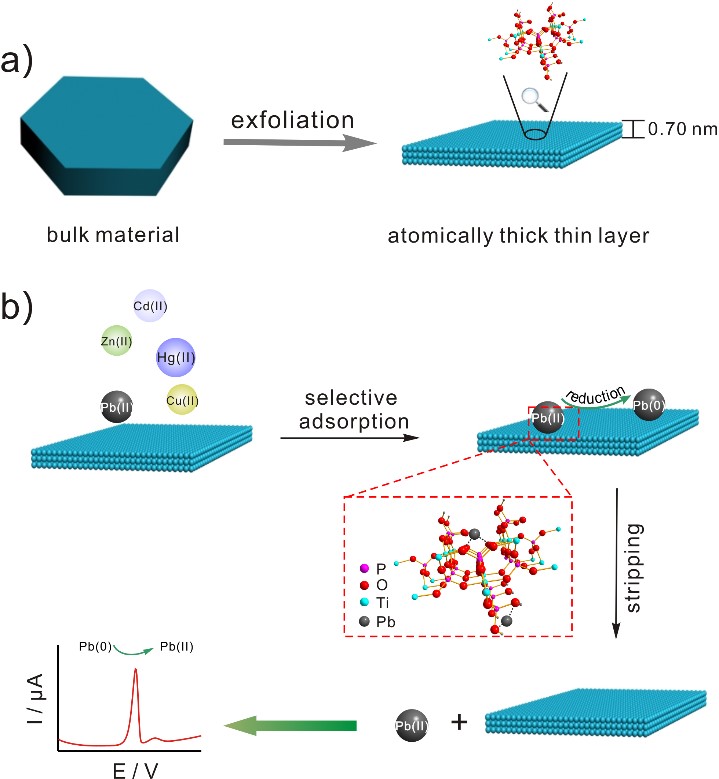Selective and sensitive determination of lead is imperative in electrochemical technique and nanomaterials are widely used in modified electrode electrochemical detection of heavy metal ions due to its special properties, such as large specific surface area, high activity sites, excellent electronic conductivity, etc. Various composite modified electrodes have been employed to measure Pb(II). The metal phosphate nanomaterials including zirconium phosphate (ZrP), tin(IV) phosphates and titanium phosphate (TiP) and their compound have shown excellent adsorption capacity toward heavy metal ions and well selective adsorption toward Pb(II). Some properties of these materials e.g. intercalation chemistry, catalytic properties, ion exchange capacities have been widely investigated. However, the electrochemical applications of metal phosphate materials are studied rarely due to their poor conductive properties. As reported, after the exfoliation of layered compounds, the active functional groups, reactivity of the material and electrochemical activities can be efficiently improved.
Recently, Asso. Prof. GUO Zheng from Institute of Intelligent Machines(IIM), Chinese Academy of Sciences (CAS) has a significant progress in realizing a sensing interface for sensitive detection of Pb(II) using atomically thick titanium phosphate (TiP) thin layer. This work is of great importance in the field that the system of an atomically thin layer offers possibilities to improve the sensitivity of the electrochemical analysis for Pb(II). It was published in journal of RSC Advances, 2016, 6, 72975.
In this work, amorphous phase formation of atomically thick TiP thin layer was prepared via a simple hydrothermal process and intercalation reaction subsequently. Applied TiP thin layer as sensing materials for the analysis of Pb(II) with square wave anodic stripping voltammetry (SWASV), the researchers firstly showed the stripping signals for selective detection of Pb(II). Compared with bulk TiP, TiP thin layer exhibited electrochemical response performance, which could ascribe to the abundant exposure of Ti–OH on the surface of TiP thin layer. Hydroxyl groups in activated Ti sites facilitated the sorption behavior to Pb(II) and the formation of the inner sphere complex with TiP by Ti–O–Pb, while the uptake of other cations is only driven by electrostatic interaction. This work is of great significance for improving the sensitivity and selective of electrochemical performance for heavy metal ions based on metal phosphate and thin layer materials. Meanwhile, this route can be extended to prepare other functional thin layer materials.
This work is supported by the National Key Scientific Program-Nanoscience and Nanotechnology and the National Natural Science Foundation of China.

Schematic illustration of (a) the synthesis of TiP thin layer and (b) selective electrochemical detection of Pb(II).
Article click: http://pubs.rsc.org/en/content/articlelanding/2016/ra/c6ra08679a#!divAbstract
Title: An atomically thick titanium phosphate thin layer with enhancing electrochemical sensitivity toward Pb(II)
Keywords: Titanium phosphate thin layer; Pb(II); Electrochemistry
Contact:
Asso. Prof. GUO Zheng, Ph. D
Institute of Intelligent Machines, Chinese Academy of Sciences, Hefei 230031, China
Tel: 86-551-6559-1167
Email: zhguo@iim.ac.cn
